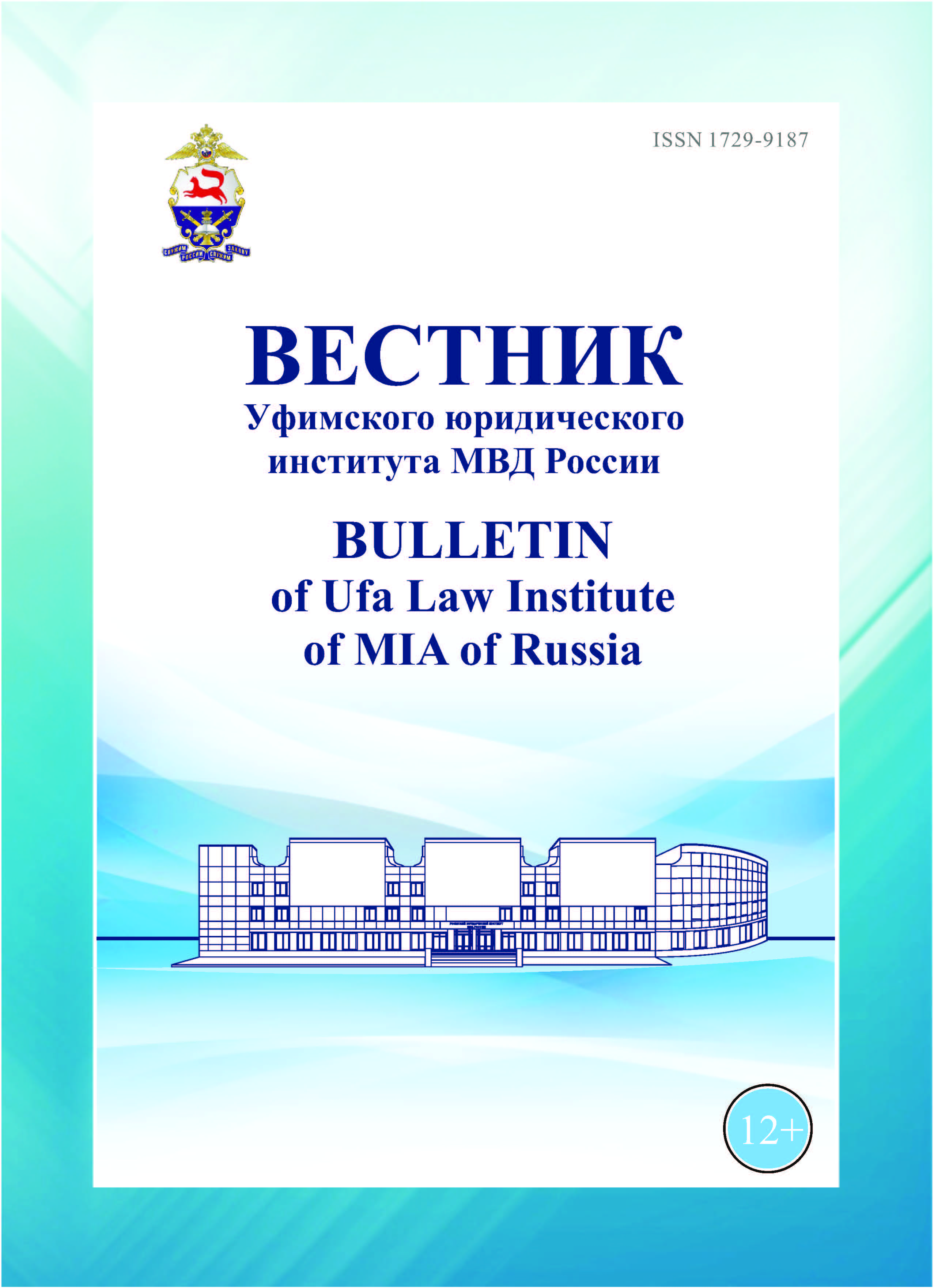Ufa, Ufa, Russian Federation
UDC 343.13
The creation of a single investigative body, as one of the many proposals to improve legislation, aimed at ensuring an objective and impartial approach of officials to the investigation of crimes, deserves the closest attention. However, there are arguments both in favor and against such a decision. We believe that they should be assessed based on the holistic concept of procedural management of the investigation of crimes, which finds its application in relation to the criminal procedural statuses of investigators, inquirers, heads of investigative bodies, heads of bodies and departments of inquiry, prosecutors and judges, who, by their decisions, within the framework of available procedural powers have a controlling, organizing and coordinating influence on other participants in the criminal process, which subsequently directly or indirectly affects its outcome and the achievement of the purpose of criminal proceedings.
management through criminal procedural powers, investigation of crimes, concept, single investigative body, procedural powers, objectivity, impartiality, improvement of legislation.
1. Gusak V. V. The place of procedural management of crime investigations in the system of criminal procedural functions // Bulletin of Ufa Law Institute of the Ministry of Internal Affairs of Russia. 2020. No. 3 (89). P. 81–88. (In Russ.)
2. Obraztsov A. V. Procedural management of the preliminary investigation and its subjects: monograph. Moscow: Yurayt Publishing House, 2024. 189 p. (In Russ.)
3. Popova T. Yu. Functional characteristics of the powers of the head of the investigative body // Bulletin of Omsk University. 2010. No. 1 (22). P. 161–166. (In Russ.)
4. Solovyov A. B. The problem of ensuring legality during the preliminary investigation in connection with a change in the procedural status of the prosecutor // Criminal proceedings. 2007. No. 3. P. 10–16. (In Russ.)
5. Shafer S. A. Pre-trial proceedings in Russia: stages of development of investigative, judicial and prosecutorial authorities: monograph. Moscow: Norma: INFRA-M, 2019. 192 p. (In Russ.)
6. Savickiy V. M. Ocherk teorii prokurorskogo nadzora v ugolovnom sudoproizvodstve. Moskva, 1975. 383 s.
7. Obraztsov A. V. On the status of subjects of criminal proceedings who have powers to provide procedural guidance to the investigation of crimes // Eurasian Legal Journal. 2016. No. 8. P. 222–223. (In Russ.)
8. Larin A. M. Investigation in a criminal case: procedural functions. Moscow, 1986. 159 p. (In Russ.)
9. Kalnitsky V. V. Issues of theory and practice of criminal proceedings: selected works. Omsk, 2016. 200 p. (In Russ.)
10. Strogovich M. S. About inquiry and preliminary investigation and about the “single investigative apparatus” // Socialist legality. 1957. No. 5. P. 17–26. (In Russ.)
11. Sadiokova U. V. Procedural powers of the head of the investigative body: theory and practice of implementation: abstract of thesis. dis. ... Cand. of Law. Moscow, 2020. 33 p. (In Russ.)
12. Averchenko A. K., Serov D. O. Organization of the investigative apparatus of Russia: history and modernity // Bulletin of Novosibirsk State University. Series: Law. 2006. Vol. 2. No. 1. P. 5–21. (In Russ.)
13. Tsvetkov Yu. A. Sovereign national model of investigative power: myth or reality? // Organization of preliminary investigation. Problems and prospects: materials of the international scientific and practical conference. Moscow, 2015. P. 104–109. (In Russ.)
14. Kolesnikov O. V. Head of the investigative body in the system of the Ministry of Internal Affairs of Russia as a participant in criminal proceedings: theoretical and organizational-legal problems. Moscow, 2012. 159 p. (In Russ.)
15. Golovko L. V. Police reform in the context of modernization of preliminary proceedings in the Russian criminal process // Criminal justice: connection of times: selected materials of the international scientific conference. Moscow, 2012. P. 24–31. (In Russ.)
16. Konovalov S. G. Elements of the German model of pre-trial proceedings in the criminal process of post-Soviet states: dis. ... Cand. of Law. Moscow, 2018. 220 p. (In Russ.)
17. Pyankova N. V. Implementation of the principle of autonomy and independence of the investigator, head of the investigative body in relations with the prosecutor and the court: dis. ... Cand. of Law. Nizhny Novgorod, 2022. 232 p. (In Russ.)
18. Makhtyuk S. O. The head of the investigative body as a subject of assessing evidence in Russian criminal proceedings: dis. ... Cand. of Law. Moscow, 2024. 279 p. (In Russ.)
19. Shadrin V. S. Investigator as a participant in criminal proceedings at the turn of the third decade of application of the Criminal Procedure Code of the Russian Federation // Russian investigator. 2023. No. 4. P. 28–32. (In Russ.)
20. Kolokolov N. A. Russian investigator - an enlightened inquisitor with a human face // Criminal proceedings. 2018. No. 3. P. 3–12. (In Russ.)
21. Lazareva V. A. Russian investigator: judge or inquisitor? // Criminal proceedings. 2018. No. 4. (In Russ.)
22. Dikarev I. S. Sistema sderzhek i protivovesov v dosudebnom proizvodstve po ugolovnym delam // Zhurnal rossiyskogo prava. 2018. № 3. S. 76–83.
23. Rossinsky S. B. Pre-trial proceedings in a criminal case: the essence and methods of collecting evidence: monograph. Moscow, 2021. 408 p. (In Russ.)
24. Tarasov A. A. Investigator – a participant in the proceedings on the side of the prosecution: evil or good? // Journal of Russian Law. 2024. Vol. 28. No. 8. P. 113–126. (In Russ.)
25. Levchenko O. V. Criminal procedural activities of the prosecutor in pre-trial proceedings in a criminal case: diss. ... Doctor of Law. Ulyanovsk, 2024. 698 p. (In Russ.)
26. Davletov A. A., Azarenok N. V., Asanov R. Sh. The problem of the functions of the investigator in criminal proceedings // Russian Law Journal. 2019. No. 4. P. 57–70. (In Russ.)
27. Savitsky V. M. Essay on the theory of prosecutorial supervision in criminal proceedings. Moscow, 1975. 383 p. (In Russ.)
28. Dikarev I. S. System of checks and balances in pre-trial proceedings in criminal cases // Journal of Russian Law. 2018. No. 3. P. 76–83. (In Russ.)









